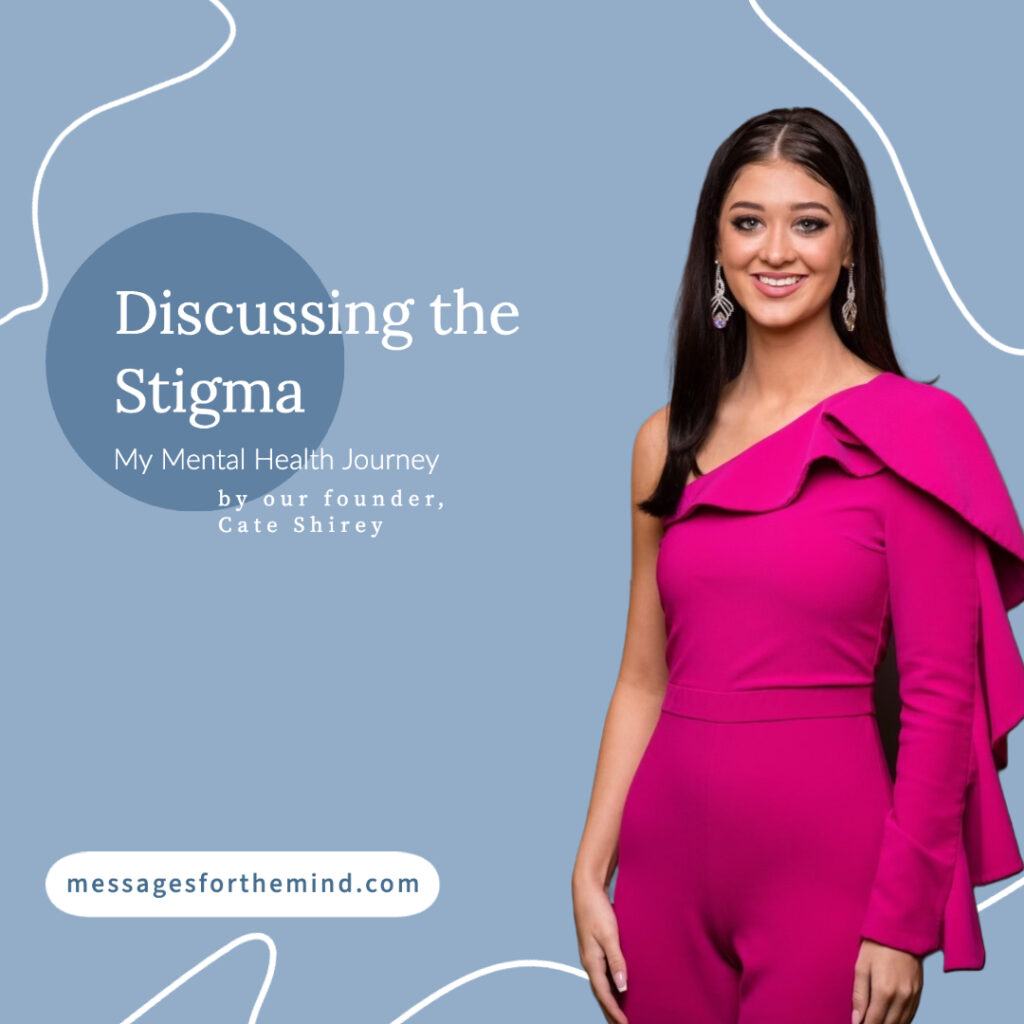by Cate Shirey

The Beginning
Five years ago, I found myself sitting at one of my favorite restaurants with my mom after having an amazing day. Within a few minutes of sitting down however, I began sobbing. My mother quickly asked me what was wrong, but I couldn’t answer. I didn’t know what was wrong. We just had an amazing day, but I just didn’t feel right. I couldn’t understand what was wrong with me, but it was then that we knew I needed to seek a professional’s opinion. Honestly, mental health hadn’t been at the forefront of my mind, and I certainly didn’t imagine I had a mental illness. With a family history of mental illness, my mother knew that it would be best for someone to see me even if there was the slightest chance of me developing one.
The Diagnosis
We made an appointment with a local psychologist as soon as possible. I was diagnosed with severe anxiety and depression. I remember thinking to myself, “Anxiety and depression? I’m a sophomore in high school, with loving parents, an amazing school, and great friends, what do I have to be depressed or anxious about?“. I didn’t feel like these things I was experiencing were valid. Even more daunting, I received a prescription for the first kind of anxiety medication I would take. Additionally, they recommended therapy alongside the pills to teach me coping mechanisms. This made my diagnosis even more scary to me, as I had been in grief counseling therapy a few years prior after the passing of my grandparents. Long story short, it didn’t go well for me then, so how would this time be different?
The Stigma
As the week went on I sat with my diagnosis. I felt damaged and ashamed. I didn’t tell anyone around me what happened, not for several months. There wasn’t a lot of media advocating for the importance of mental health back then. At least, none that I was regularly seeing. I remember being afraid that if the people around me found out about it, everyone would leave. I feared being alone and unliked more than anything. It burdened me heavily and only caused more issues with my mental health. Eventually, I told a few of my closest friends, who did nothing but reassure me and lift me up. Now that I had a few more people supporting me, I dived in to treatment.
The Treatment
As the months following went by, I tried two different medications and two different therapists. I had medication that I took daily, and medication that I took before things that could be anxiety triggers. I saw my latest therapist, begrudgingly, twice a month. Finding the right therapist was difficult for me. The experience I had those years ago in grief counseling clouded my perception of therapy. I was pessimistic and unwilling to work with the therapists I saw, and eventually stopped going. My mom and my doctor pushed me to try therapy one last time as it was a key component in managing my mental illness. We searched thoroughly for a therapist that fit what I needed, and eventually made an appointment for one that I thought fit the most. Still apprehensive, I went into that appointment sure that it wasn’t going to work out. Luckily for me, it did.
Therapy
I can’t stress the importance of finding the right therapist for your needs and personality. It took me several tries and many negative experiences until I finally found a good match. Even through my pessimistic attitude, this therapist was patient and didn’t push me further than I was willing to go. They waited as many sessions as it took for me to open up and finally make a breakthrough. It was like a giant weight had been lifted from my shoulders. I now had the tools and resource to begin coping with my mental illness instead of just managing it with medication. Through basic talk therapy sessions, to more structured and involved sessions, and everything in between, I gained valuable tools to help in everyday life.
Medication
A few years passed and I was a sophomore in college. Still on the medication I was on in 2017, I realized that I felt numb to the world. My dosage had increased over the years from the 20 milligram starting dose, to 100. It was too much for me, I no longer felt any emotions good or bad. I wasn’t excited for things I should be excited for, I stopped doing things that I love, and I wasn’t socializing with my friends. I was, simply, existing. It was a scary thought having to start over with a new medication but, just like with therapy, it is important to find what works best for you. Even things that work for you in the past don’t necessarily work for you in the future. It is important to listen to your mind consistently.
Present Day
Now here in 2023, I am on the medication that I switched to in 2020. With only a small increase from the starting dosage, I found what works best for me currently. I feel my emotions and have the space to use the tools given to me in therapy. I’m still seeing my therapist consistently (when I remember to book more appointments) and try to be more mindful about my mental health. Healing is not linear. There are days when I feel like my world is collapsing and my progress is shattered. But, there are also days when I feel like nothing can stop me. My biggest pieces of advice is to surround yourself with people that support you, and listen to what your body and mind need. Mental health is so important, and the stigma surrounding it can cause those in need to deny themselves the help they need.
I created Messages for the Mind to help fight the stigma surrounding mental health. My hope is that it becomes a safe space for people to share their stories, and for people to go for advice or to see that they are not alone. I wholeheartedly urge you to listen to your mind and never be ashamed of taking care of yourself.
If you or a loved one is struggling with mental illness, please do not be afraid to seek help. For general information on mental health and to locate treatment services in your area, call the Substance Abuse and Mental Health Services Administration National Helpline at 1-800-662-HELP (4357). Always dial 911 if it is an emergency.
